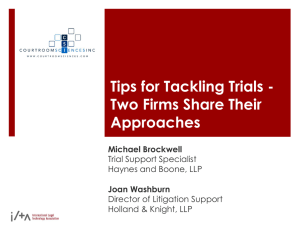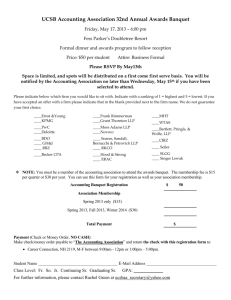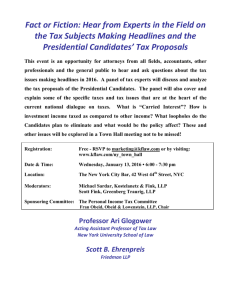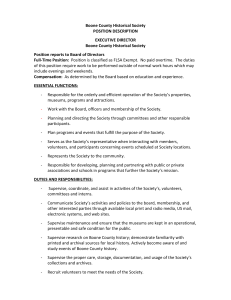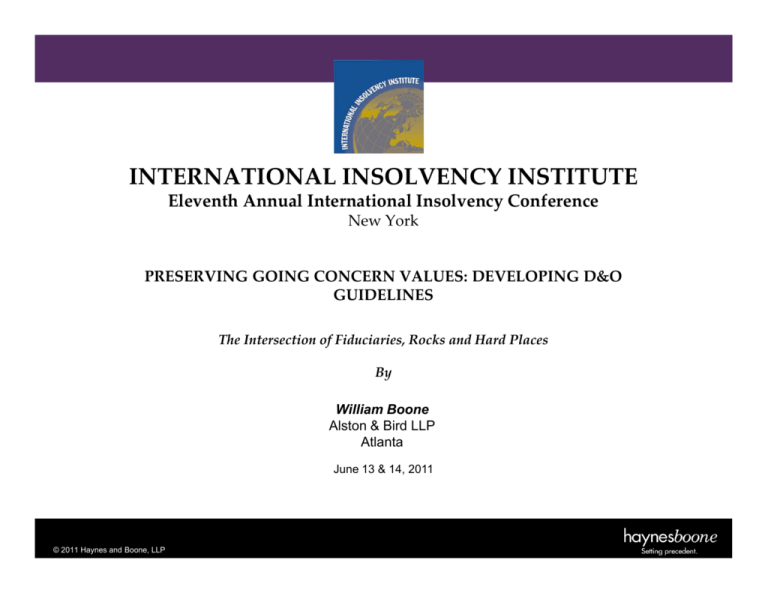
INTERNATIONAL INSOLVENCY INSTITUTE
Eleventh Annual International Insolvency Conference
New York
PRESERVING GOING CONCERN VALUES: DEVELOPING D&O
GUIDELINES
The Intersection of Fiduciaries, Rocks and Hard Places
By
William Boone
Alston & Bird LLP
Atlanta
June 13 & 14, 2011
©International Insolvency Institute 2011. All rights reserved.
© 2011 Haynes and Boone, LLP
THE INTERSECTION OF
FIDUCIARIES, ROCKS AND HARD
PLACES UNDER U.S. LAW
“To Fiduch, Or Not To Fiduch--That Is The Question”
© 2011 Haynes and Boone, LLP
Jarom Yates, Bankruptcy Associate at Haynes
and Boone, LLP, is primarily responsible for the
preparation of these materials (In other words, I’m
really the one who wrote this).
Robin Phelan, Bankruptcy Partner at Haynes and
Boone, LLP, is primarily responsible for the
delegation of the preparation of the these
materials, providing inspiration, and dispensing
wisdom (that’s his story, anyway).
© 2011 Haynes and Boone, LLP
Why Fiduciary Duties?
• “[W]here there is a separation of legal control
from beneficial ownership, equity imposes
fiduciary duties upon those in control to protect
the beneficiaries who are not in a position to
protect themselves.” Official Committee of
Unsecured Creditors of Fedders North Am., Inc.
v. Goldman Sachs Credit Partners LP (In re
Fedders North Am., Inc.), 405 B.R. 527, 539
(Bankr. Del. 2009)
© 2011 Haynes and Boone, LLP
Who owes fiduciary duties
• Directors
• Officers
Gantler v. Stephens, 965 A.2d 695, 708-09
(Del. 2008)
© 2011 Haynes and Boone, LLP
What fiduciary duties are owed
• Duty of Care
• Duty of Loyalty
– Duty of Good Faith
© 2011 Haynes and Boone, LLP
Business Judgment Rule
• Deferential rule that presumes directors
have acted appropriately.
•
“Our law presumes that in making a business decision
the directors of a corporation acted on an informed
basis, in good faith, and in the honest belief that the
action taken was in the best interests of the company.”
Brehm v. Eisner (In re Walt Disney Co. Derivative
Litigation), 906 A.2d 27, 52 (Del. 2006).
© 2011 Haynes and Boone, LLP
Business Judgment Rule
• Business judgment rule shields directors and
managers from liability for taking risks in pursuit
of profits
• “But business failure is an ever-present risk.
The business judgment rule exists precisely to
ensure that directors and managers acting in
good faith may pursue risky strategies that seem
to promise great profit.” Trenwick Am. Litigation
Trust, v. Ernst & Young, LLP, 906 A.2d 168, 193
(Del. Ch. 2006).
© 2011 Haynes and Boone, LLP
Business Judgment Rule
• “Under normal circumstances, neither the courts
nor the stockholders should interfere with the
managerial decisions of the directors. The
business judgment rule embodies the deference
to which such decisions are entitled.” Paramount
Commcn’s, Inc. v. QVC Network, Inc., 637 A.2d
34, 42 (Del. 1993)
© 2011 Haynes and Boone, LLP
Overcoming Business Judgment
• The presumptions underlying the business judgment rule
“can be rebutted if the plaintiff shows that the directors
breached their fiduciary duty of care or of loyalty or acted
in bad faith. If that is shown, the burden then shifts to
the director defendants to demonstrate that the
challenged act or transaction was entirely fair to the
corporation and its shareholders.” In re Walt Disney Co.
Derivative Litigation, 906 A.2d at 52.
© 2011 Haynes and Boone, LLP
Duty of Care
• “The fiduciary duty of care requires that directors
of a Delaware corporation use that amount of
care which ordinarily careful and prudent men
would use in similar circumstances.” In re Walt
Disney Co. Derivative Litigation, 907 A.2d at 749
(quotes omitted).
• Duty to be informed (e.g. due diligence)
• Duty to inquire
© 2011 Haynes and Boone, LLP
Duty of Care Cont’d
• The standard for showing a breach of the
duty of care is “gross negligence.”
• “The exact behavior that will constitute gross negligence
varies based on the situation, but generally requires
directors and officers to fail to inform themselves fully and
in a deliberate manner.” In re Fedders 405 B.R. at 539.
• Example of gross negligence would be: “[Where] a board
undertook a major acquisition without conducting due
diligence, without retaining experienced advisors, and
after holding a single meeting at which management
made a cursory presentation.” Trenwick, 906 A.2d at 194.
© 2011 Haynes and Boone, LLP
Duty of Loyalty
• The Duty of Loyalty prohibits self-interested
transactions
• “Classic examples of director self-interest in a
business transaction involve either a director
appearing on both sides of a transaction, or a
director receiving a personal benefit from a
transaction not received by the shareholders
generally.” Cede & Co. v. Technicolor, Inc., 634
A.2d 345, 362 (Del. 1993)
© 2011 Haynes and Boone, LLP
Duty of Loyalty
• Duty to act in good faith is a subsidiary element of the
duty of loyalty. Stone v. Ritter, 911 A.2d 362 (Del. 2006).
• Three examples of conduct not in good faith:
– Where fiduciary “intentionally acts with a purpose other than that
of advancing the best interests of the corporation.” In re Walt
Disney Co. Derivative Litigation, 906 A.2d at 67.
– Where fiduciary acts “with the intent to violate applicable positive
law.” Id.
– Where fiduciary “intentionally fails to act in the face of a known
duty to act, demonstrating a conscience disregard for his duties.”
Id.
© 2011 Haynes and Boone, LLP
Duty of Loyalty and Disclosure of
Conflicts
• Disclosing a conflict, by itself, will not shield a
fiduciary from liability for breaching the duty of
loyalty.
• “To have a conflict and to be motivated by it to breach a
duty of loyalty are two different things—the first a factor
increasing the likelihood of a wrong, the second the
wrong itself. Thus a disloyal act is actionable even when
a conflict of interest is not—one difference being that the
conflict is disclosed, the disloyal act is not.” CDX
Liquidating Trust v. Venrock Assocs., No. 10-1953, 2011
U.S. App. Lexis 6390 (7th Cir. March 29, 2011).
© 2011 Haynes and Boone, LLP
Rebutting the Business Judgment
Rule
• Where the business judgment rule is
rebutted by a breach of the duty of care,
duty of loyalty, or duty of good faith, the
burden shifts to the fiduciary to prove the
“entire fairness” of the transaction. Cede &
Co. v. Technicolor, Inc., 634 A.2d at 361.
© 2011 Haynes and Boone, LLP
Entire Fairness
• Entire fairness requires showing of:
– Fair dealing and
– Fair price
Cede & Co. v. Technicolor, Inc., 634 A.2d at
361
© 2011 Haynes and Boone, LLP
Exculpatory Provisions
• 8 Del. C. § 102(b)(7) permits the certificate of
incorporation to contain a provision eliminating
director liability to a corporation for a breach of
the duty of care.
• 8 Del. C. § 102(b)(7) does not permit, however,
exculpation for, among other things, (i) a breach
of loyalty or (ii) acts or omissions not in good
faith.
• 8 Del. C. § 102(b)(7) does not provide for an
exculpatory provision shielding officers. Gantler
v. Stephens, 965 A.2d at 709 n. 37.
© 2011 Haynes and Boone, LLP
To whom are fiduciary duties
owed?
• “But to say that a man is a fiduciary only
begins analysis; it gives direction to further
inquiry. To whom is he a fiduciary?” SEC
v. Chenery Corp., 318 U.S. 80, 85 (1943).
© 2011 Haynes and Boone, LLP
Directors and officers owe fiduciary
duties to:
• The corporation
• Shareholders
Malone v. Brincat, 722 A.2d 5, 10 (Del.
1998)
• What about creditors?
© 2011 Haynes and Boone, LLP
North American Catholic Educational
Programming Foundation, Inc. v. Gheewalla,
930 A.2d 92 (Del. 2007)
• Two primary issues addressed by the
court in Gheewalla
– Whether creditors may bring direct claims
against directors
– Whether directors owe fiduciary duties to
creditors while in “The Zone of Insolvency”
© 2011 Haynes and Boone, LLP
Gheewalla Cont’d
• Creditors do not have standing to bring direct
claims for breach of fiduciary duty when
corporation is operating in the “Zone of
Insolvency.”
• “No direct claim for breach of fiduciary duties
may be asserted by the creditors of a solvent
corporation that is operating in the zone of
insolvency.” Gheewalla, 930 A.2d at 101
© 2011 Haynes and Boone, LLP
Gheewalla Cont’d
• Fiduciary duties do not change in “The Zone of
Insolvency.”
• “When a solvent corporation is navigating in the
zone of insolvency, the focus for Delaware
directors does not change: directors must
continue to discharge their fiduciary duties to the
corporation and its shareholders by exercising
their business judgment in the best interests of
the corporation for the benefit of its shareholder
owners.” Gheewalla, 930 A.2d at 101.
© 2011 Haynes and Boone, LLP
Gheewalla Cont’d
• Creditors of an insolvent corporation, are
only entitled to bring derivative, but not
direct, claims for breach of fiduciary duty.
• “Individual creditors of an insolvent corporation
have the same incentive to pursue valid
derivative claims on its behalf that shareholders
have when the corporation is solvent.”
Gheewalla, 930 A.2d at 102.
© 2011 Haynes and Boone, LLP
Gheewalla Cont’d
• “It is well settled that directors owe fiduciary
duties to the corporation. When a corporation is
solvent, those duties may be enforced by its
shareholders, who have standing to bring
derivative actions on behalf of the
corporation…When a corporation is insolvent,
however, its creditors take the place of the
shareholders as the residual beneficiaries of any
increase in value.” Gheewalla, 930 A.2d at 101.
© 2011 Haynes and Boone, LLP
When is a corporation insolvent?
© 2011 Haynes and Boone, LLP
Insolvency—Cash Flow Test
• Cash Flow Test
– Inability to pay debts as they come due
© 2011 Haynes and Boone, LLP
Insolvency—Balance Sheet Test,
but which one?
• “[A]n entity is insolvent when it has liabilities in
excess of reasonable market value of assets
held.” Geyer v. Ingersoll Publ’ns Co., 621 A.2d
784, 789 (Del. Ch. 1992).
• “[A] deficiency of assets below liabilities with no
reasonable prospect that the business can
be successfully continued in the face
thereof.” Production Res. Group v. NCT Group,
Inc., 863 A.2d 772, 782 (Del. Ch. 2004)
(emphasis added).
© 2011 Haynes and Boone, LLP
Balance Sheet Insolvency—The
Third Circuit’s Answer
• In re Teleglobe, 493 F.3d 345 (3d Cir. 2007) adopted the
heightened Production Resources standard.
• On remand, the plaintiffs argued that the Third Circuits
adoption of the heightened solvency requirement “adds
an unreasonable qualifier to the basic definition of
insolvency.” The Bankruptcy Court rejected the
Plaintiffs’ argument noting that “Delaware courts have
recognized the Production Resources definition of
insolvency in situations similar to the instant case,”
pointing specifically to the Delaware Supreme Court’s
decision in Gheewalla. In re Teleglobe, 392 B.R. 561,
599 (Bankr. Del. 2008).
© 2011 Haynes and Boone, LLP
Trenwick America Litigation Trust
v. Ernst & Young, LLP, 906 A.2d
168 (Del. Ch. 2006)
• Among the issues addressed by the court:
– Whether Delaware law recognizes a cause of
action for “Deepening Insolvency”
– To whom and in what circumstances the
directors of a wholly owned subsidiary owe
fiduciary duties
© 2011 Haynes and Boone, LLP
Trenwick Cont’d
• Under Delaware law, “Deepening Insolvency” is
not an independent cause of action.
• “Delaware law imposes no absolute obligation on the board of a
company that is unable to pay its bills to cease operations and to
liquidate.” Trenwick, 906 A.2d at 204.
• “If the board of an insolvent corporation, acting with due diligence
and good faith, pursues a business strategy that it believes will
increase the corporation’s value, but that also involves the
incurrence of additional debt, it does not become a guarantor of that
strategy’s success.” Id.
• “[T]he appropriate tool to examine the conduct of the directors [of an
insolvent corporation] is the traditional fiduciary duty ruler.” Id.
© 2011 Haynes and Boone, LLP
Trenwick Cont’d
• The directors of a wholly owned Delaware
corporation owe their fiduciary duties to the
parent.
• “‘[I]n a parent and wholly owned subsidiary
context, directors of the subsidiary are obligated
only to manage the affairs of the subsidiary in
the best interests of the parent and its
shareholders.’” Trenwick 906 A.2d at 200,
(quoting Anadarko Petro. Corp., 545 A.2d 1171,
1174 (Del. 1988)).
© 2011 Haynes and Boone, LLP
Trenwick Cont’d
• What duties, if any, are owed by the
directors of a wholly owned subsidiary
to creditors?
• “At most, one might conceive that the directors
of a wholly-owned subsidiary owe a duty to the
subsidiary not to take action benefiting a parent
corporation that they know ill render the
subsidiary unable to meet its legal obligations.”
Trenwick 906 A.2d at 203.
© 2011 Haynes and Boone, LLP
Europe and Beyond
• But if you’re in certain countries in Europe
and other parts of the world and the
company trades while insolvent.
© 2011 Haynes and Boone, LLP
Director
© 2011 Haynes and Boone, LLP
Sevilla
© 2011 Haynes and Boone, LLP
Hamburg
© 2011 Haynes and Boone, LLP
Hamburg
© 2011 Haynes and Boone, LLP

